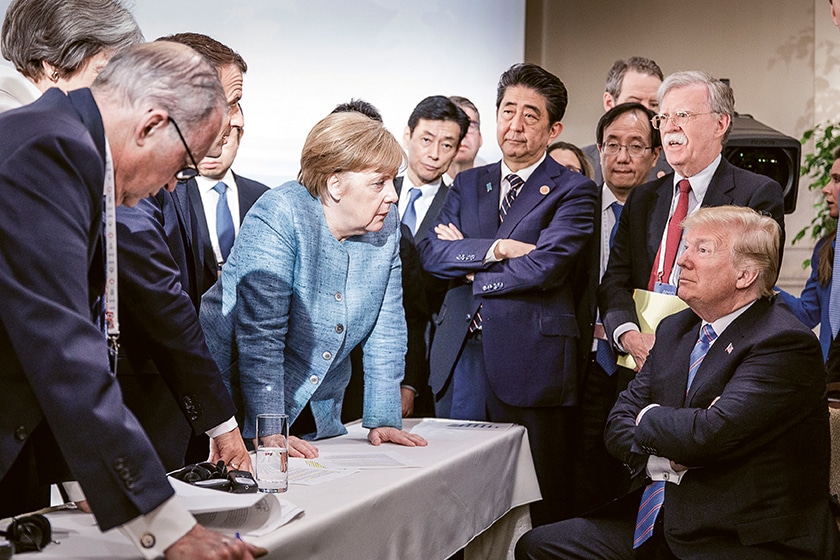Trump’s Liberation Day
The measures chosen by Donald Trump to address the trade deficit crisis may be controversial, but in practice, he had no other choice.
One of the most characteristic images from Donald Trump’s first presidential term, remembered around the world, is the one showing him seated among outraged Western leaders. The photo was taken during the G7 summit held in July 2018. At that time, the American president had already launched his first, in retrospect rather cautious, trade war with several governments who were also shocked by his stance on sustainable development policy.
War with Everyone
Nearly seven years later, Trump has deployed much heavier artillery for his renewed war. Furthermore, he is no longer fighting just selected governments, but literally the entire world. On April 2, the White House announced that the base tariff rate for products from most countries would be 10%, but 20% for the European Union and as much as 34% for China. Neighbors Mexico and Canada will pay 25%, as will all car importers.
Donald Trump has long faced harsh criticism for his highly confrontational policies, which are often marked by unexpected turns. This time, however, he has done something that has triggered a near-unanimous outcry across the globe. In many respects, his „Liberation Day” will go down in history as one of the pivotal moments not only in economic affairs but also in political developments in recent years.
Why has this trade war with nearly the entire world been labeled “Liberation Day” by the new administration? According to Trump, the United States has just declared “economic independence” and sparked a revival of its domestic industry. In the president’s view, the vast majority of countries have until now exploited the United States—reaping the benefits of open access to the American market while simultaneously restricting access to their own.
A Rescue Mission
It is difficult to disagree with Donald Trump. Although maintaining a significant trade deficit with the rest of the world aligns with the interests of the American empire, its size must never exceed a threshold that would threaten the stability of the U.S. financial system or even the solvency of the American state. This simple principle seemed lost on (or cynically disregarded by) Trump’s predecessor, who left the United States with a record-breaking deficit. At the very end of the Biden administration, the U.S. trade deficit rose by as much as $124 billion in just one month (January, during the transfer of power), marking the worst record of all time.
While today Trump faces sharp criticism, virtually none of these voices protested when his predecessor was dragging the U.S. toward the abyss. Moreover, Biden’s policies posed a risk not only to the United States but also to the entire Western world, whose position largely relies on American financial and military dominance.The situation can be likened to the USAID scandal, where the agency had, for years, funded a massive number of media outlets and organizations around the world, supporting radical left-wing circles in the process. Trump shut down the funding pipeline to this global NGO network, sparking massive outrage from those who had lost their revenue streams. For American taxpayers to have subsidized thousands of lobbyists and agents across the globe was a complete aberration that should have ended long ago—but the media and political elites, of course, condemned Trump.
Likewise, the American financial system had in recent years become a true cash cow for the entire world, pleasing everyone—except American patriots. The U.S. economy was flooded with foreign products, while massive amounts of dollars circulated the globe, making it easier for all governments to pursue aggressive credit policies. To some extent, Americans themselves benefited, as they could effortlessly import whatever they desired. However, the explosive growth of the deficit in recent months created an unprecedented situation threatening the stability of the dollar and the entire economy. Without a response, trust in the American currency could have quickly evaporated, and a weakened dollar would have made managing the already dangerously high national debt even more difficult.
Trump had absolutely no choice but to act swiftly and decisively, and he chose to raise tariffs for the vast majority of countries all at once. Although Trump’s negotiating skills are frequently questioned by unfriendly media outlets, what happened on April 2 must be recognized as a demonstration of considerable finesse. Theoretically, Trump turned the world against him—but in reality, he put everyone under pressure to reach agreements as quickly as possible. Contrary to narratives about a weakening hegemon, the United States still retains enough financial muscle to dictate terms to the world and expect that others will strive to strike a deal.
An Offer for Friends
Rarely mentioned is the fact that just as important as the new tariffs introduced on “Liberation Day” are the trade deals struck almost simultaneously with a select group of countries whose leaders share a special relationship with Trump. This applies particularly to Israel, which, a day before Trump’s announcement, declared the complete removal of all tariffs on goods imported from the United States. A similar agreement is being prepared with Argentine President Javier Milei, and a special deal mitigating the impact of a potential trade war with the European Union has also been signed with Hungary. This decidedly pro-Israel group of countries has the potential to form a vast free trade zone, setting entirely new rules of cooperation in a world that until recently was dominated by complex multilateral trade agreements.
Donald Trump has laid his cards on the table and is now waiting for the world’s response. The first countries, such as Taiwan and Vietnam, have already expressed a willingness to cooperate and adapt to the new conditions. Nations led by ideological opponents of the American president—chief among them Germany, France, the United Kingdom, and Canada—will try to put up prolonged resistance. In practice, however, they are bound to fail. The United States still possesses a robust arsenal of financial and political tools to force even the most stubborn nations into submission—unless, of course, they choose the path of self-imposed poverty like Cuba or Venezuela. This applies especially to European countries, which, despite their loud rhetoric and claims of being able to build their own military force, remain heavily dependent on their American partner.
Leading media outlets are predicting that Trump’s tariff policy will plunge the world into crisis. Despite temporary stock market drops and rising prices for certain goods, the long-term effect of his actions will be quite the opposite. The healing of the American economy has just begun.







